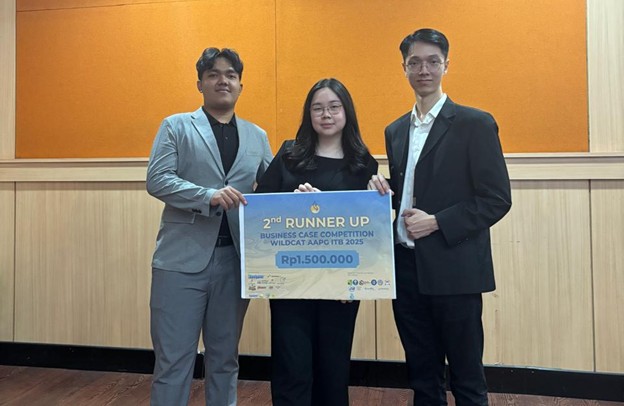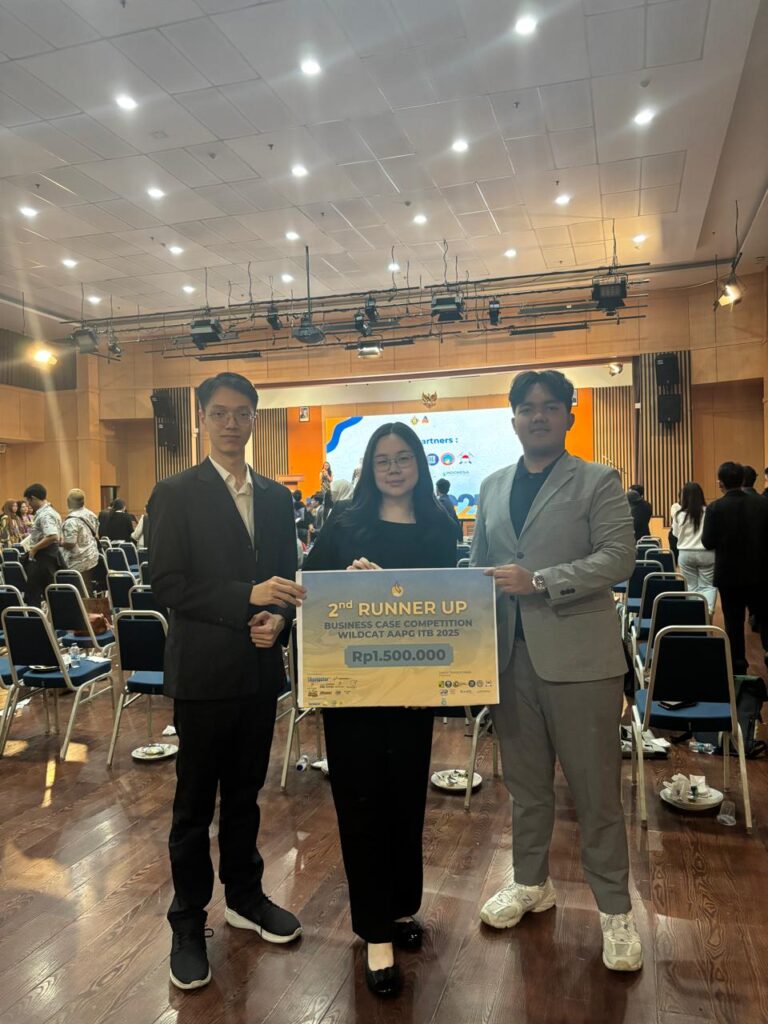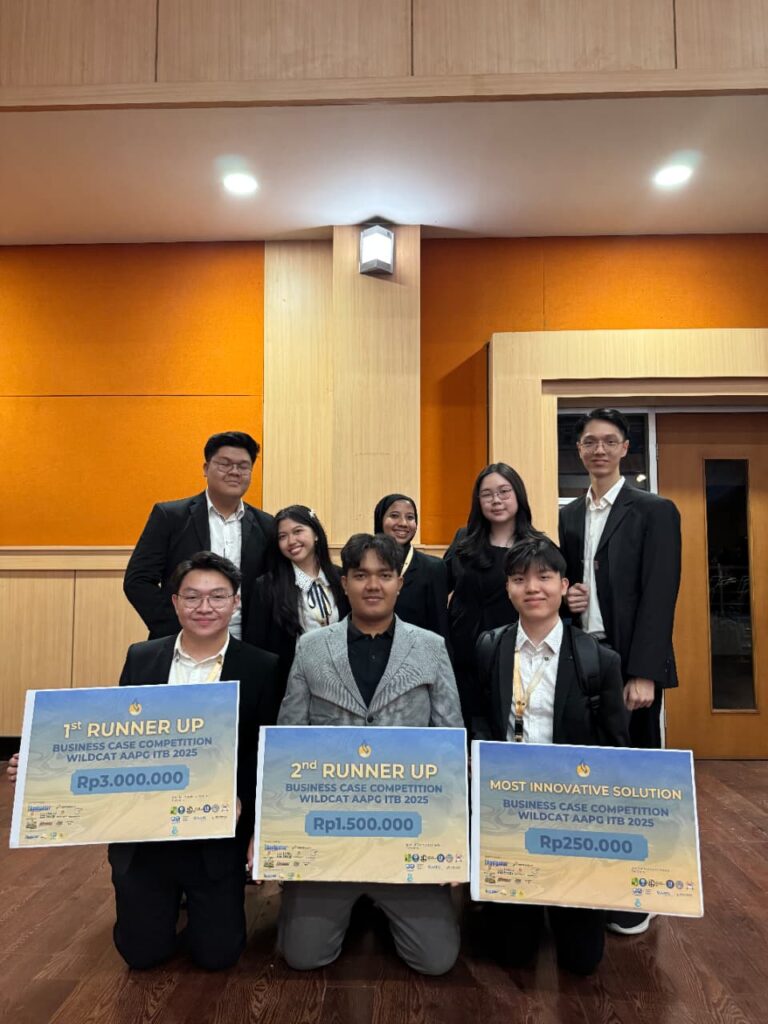VBL Vortis Wins 3rd Place (2nd runner up) at the Wildcat Business Case Competition 2025
Introduction to the Competition
Louis Hartanto Utomo, Venda Patricia Djunaidi, and Bangkit Pramesta Yulianto, students of BINUS University majoring in Industrial Engineering, class of 2023, proudly represented their team, VBL Vortis, in the Wildcat Business Case Competition 2025, organized by AAPG ITB as part of its annual Wildcat event series. This year’s theme, “Exploring and Innovating Earth’s Resources to Drive a Sustainable Energy Transition”, reflected the urgent need for sustainable innovation in the global energy sector. The case, designed in collaboration with PT PLN, challenged students to find real solutions for expanding the adoption of Renewable Energy Certificates (RECs) in Indonesia.
The competition ran from July 26, 2025 (Case Release) to September 20, 2025 (Closing Ceremony). Open to D3, D4, and undergraduate students worldwide, it drew participation from 31 teams, each comprising two to three members. The structure included two main stages: an online proposal submission, followed by an on-site final pitching at ITB for the Top 10 teams. Against this backdrop of intense competition, VBL Vortis embarked on a transformative journey that blended academic knowledge, practical strategy, and compelling storytelling.
Journey Through the Competition
VBL Vortis began their journey with the proposal submission stage, where they crafted a strategy rooted in the RDA framework (Repositioning, Digitalization, Activation). Their solution was designed to tackle PLN’s challenge of driving mass REC adoption. The proposal emphasized not just technical feasibility but also market appeal, risk management, and financial impact.
Their proposal earned them 5th place among the 31 submissions, securing a spot in the Top 10 finalists. This milestone validated the strength of their ideas while pushing them to refine their strategy further for the live presentation. As they advanced, they developed a comprehensive pitch deck titled:
“Unlocking Mass REC Adoption for Indonesia’s Low Carbon Future through RDA Strategy Powered by the Bass Diffusion Model.”
During the final pitching, they highlighted their roadmap for implementation, assessed risks with clear mitigation strategies, and presented financial projections to demonstrate the practicality of their ideas. The experience demanded both intellectual rigor and presentation finesse, testing their ability to communicate complex solutions in a persuasive way.
Motivation Behind Participation
VBL Vortis entered the competition with motivations that went far beyond winning. They wanted to translate academic insights into real-world impact, contributing directly to Indonesia’s green energy journey. For them, this was a chance to bridge the gap between theory and industry, taking concepts they had studied and turning them into actionable strategies that could resonate with stakeholders like PLN.
Another key motivation was personal and professional growth. The competition provided a platform to sharpen essential skills such as problem-solving, teamwork, and storytelling. Working together under time pressure, they learned how to merge different strengths into one cohesive vision. By presenting to industry experts, they gained valuable experience in delivering ideas to a professional audience something that textbooks alone could never teach.
Above all, they were motivated by a desire to make a difference. Participating in this case competition was not just about proving their abilities but about being part of a movement toward a sustainable, low-carbon future for Indonesia.
Results and Achievements
The efforts of VBL Vortis culminated in a remarkable achievement: they secured 3rd place (2nd runner-up) in the international competition. Standing on the podium alongside other outstanding teams was not only a recognition of their hard work but also a validation of the strategic depth and practicality of their solution.
Their journey from being one of 31 teams, ranking 5th in the proposal stage, and eventually making it to the Top 3, was proof of their determination and resilience. The award reflected not just their ability to craft a strong strategy but also their skill in delivering it persuasively under high-stakes conditions.
This accomplishment positioned them as an example of how student-led ideas can contribute meaningfully to industry challenges in sustainability. The recognition also reaffirmed their belief that young innovators can provide fresh perspectives and create real impact in shaping the future of energy.
Reflections on the Experience
For VBL Vortis, the competition was more than a contest it was a transformational learning journey. They realized that success in such events requires a balance of strategic ideas, rigorous analysis, and engaging communication. A strong concept alone is not enough; it must be delivered in a way that resonates with both technical experts and broader stakeholders.
They also learned the importance of teamwork. Each member brought unique strengths, and by leveraging those differences, the team was able to create a solution greater than the sum of its parts. Collaboration taught them how to listen, compromise, and integrate ideas effectively.
Another key reflection was the role of storytelling. While numbers and models like the Bass Diffusion framework provided credibility, it was the narrative around how RECs could transform Indonesia’s energy sector that truly connected with the judges. This reinforced their understanding that in business and sustainability, data becomes powerful when combined with human-centered storytelling.
Message for Other Students
VBL Vortis has a clear message for fellow students: be brave enough to start. Many hesitate to join competitions out of fear of failure or self-doubt, but they believe that the greatest growth happens when you step outside your comfort zone. The Wildcat Business Case Competition 2025 was not just about winning awards it was about learning, growing, and contributing ideas that matter.
They encourage others to see competitions as opportunities to:
- Learn beyond classrooms by tackling real-world challenges.
- Develop essential skills like teamwork, leadership, and communication.
- Create impact by offering innovative solutions to industries and communities.
For them, the trophy was just a bonus. The real prize was the knowledge, confidence, and experiences they gained along the way.
Conclusion
The story of VBL Vortis at the Wildcat Business Case Competition 2025 is one of dedication, innovation, and resilience. From the proposal submission to the final pitching, they demonstrated how academic ideas can be transformed into actionable strategies with real-world relevance. Their 3rd place finish was a proud achievement, but the greater reward was the journey of growth and the chance to contribute to Indonesia’s sustainable energy transition.
Their experience shows that with determination and collaboration, students can rise to global challenges and make meaningful contributions. For VBL Vortis, this was more than just a competition it was a milestone in their journey as young innovators committed to building a low-carbon future.
Documentation:







Comments :